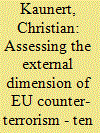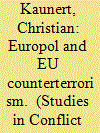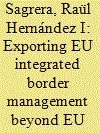|
|
|
Sort Order |
|
|
|
Items / Page
|
|
|
|
|
|
|
| Srl | Item |
| 1 |
ID:
116199


|
|
|
|
|
| Publication |
2012.
|
| Summary/Abstract |
This special issue has investigated the external dimension of European Union's (EU) counter-terrorism in much more detail than ever before. EU's counter-terrorism policy has been criticized on various grounds, ranging from questioning its efficiency, to coherence and implementation. On the one hand, the EU is characterized as a 'paper tiger', while, on the other hand, scholars point out that the EU has taken great strides toward increasing integration and encouraging cooperation between member states since 9/11. This underlines the complexity of the security environment, shaped by the threat of terrorism, in which the EU functions. Despite those efforts to provide a direction and achieve more concerted European action in the field of security, there are still many unanswered questions. Following the 11 March 2004 attacks on Madrid, which killed almost 200 people, the EU underlined the importance of deepening the international consensus to combat terrorism, which made it an increasing actor in global counter-terrorism efforts. The excellent articles in this special issue are testimony to the importance of analysing these developments.
|
|
|
|
|
|
|
|
|
|
|
|
|
|
|
|
| 2 |
ID:
097170


|
|
|
|
|
| Publication |
2010.
|
| Summary/Abstract |
This article offers an analysis of Europol's security actorness in the external dimension of EU counterterrorism. While Europol has attracted some scholarly attention, not so much work has focused on the meaning of its international agreements in counterterrorism. This article aims to investigate the international actorness of Europol at the international level in relation to the fight against international terrorism. It offers original conceptual insights based on empirical case studies of international agreements: Europol agreements with U.S. law enforcement, as well as Europol agreements with countries in the European Neighbourhood policy.
|
|
|
|
|
|
|
|
|
|
|
|
|
|
|
|
| 3 |
ID:
129584


|
|
|
|
|
| Publication |
2014.
|
| Summary/Abstract |
The external dimension of European Union (EU) border management cooperation has recently been developed, in particular through the promotion of integrated border management (IBM). The European Commission has been keen to foster IBM, an attempt to reach EU standards in the absence of an EU common border service. Integrated border management is regulated under the Treaty of Lisbon, and the Stockholm Programme calls for its further development. This article analyses and compares the policy instruments promoting IBM standards beyond EU borders, namely the European Agency for Operational Cooperation at the External Border of the Member States of the EU (FRONTEX) (with the signature of Working Arrangements with the border services of third countries) and the activity of the EU Border Assistance Mission to the Republic of Moldova and to Ukraine (EUBAM) at the Ukrainian-Moldovan border. Moreover, it provides an empirical account of IBM activity carried out in the Eastern Partnership and Russia, and explains the reasons underlying the lack of IBM promotion in the southern Mediterranean countries.
|
|
|
|
|
|
|
|
|
|
|
|
|
|
|
|
| 4 |
ID:
116193


|
|
|
|
|
| Publication |
2012.
|
| Summary/Abstract |
Having recently completed its first decade of existence, the EU's counter-terrorism policy has been receiving increasing scholarly attention as reflected in the specialized literature devoted to this emerging policy area. Its external dimension, nevertheless, has not been the subject of thorough and systematic analyses which scrutinize its characteristic features and principal actors, policies and interests. Against this backdrop, the introductory article of this Special Issue aims at providing a contextualised assessment of the external dimension of EU counter-terrorism while discussing the impact of the Lisbon Treaty upon this policy field. It proceeds with an examination of the policies, interests and actorness dynamics associated with the EU's counter-terrorism policy in highlighting the major findings and conclusions conveyed by the five contributions to this Special Issue. Its conclusion points to possible avenues for future research on the basis of identified underdeveloped topics, under-theorised aspects and neglected issues in the existing literature.
|
|
|
|
|
|
|
|
|
|
|
|
|
|
|
|
| 5 |
ID:
138874


|
|
|
|
|
| Summary/Abstract |
THE SCOTTISH independence referendum was held on 18 September 2014. From a voter turnout of 85 per cent, 55 per cent voted No to the question ‘Should Scotland be an independent country?’ The result provided something for both sides. For one, a 55 per cent
No vote can be portrayed as a decisive outcome that settles the matter for a generation. For the other, a 45 per cent Yes vote provides hope. In the short term, the hope was that the Smith Commission, formed to produce proposals for further devolution, would recommend a eaningful level of constitutional change. In the long term, it may be that the failure to deliver an adequate devolution ‘settlement’ produces enough of an appetite for a second, this time successful, referendum.
|
|
|
|
|
|
|
|
|
|
|
|
|
|
|
|
|
|
|
|
|